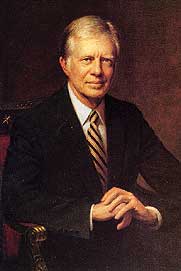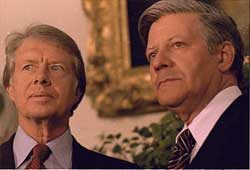James Earl Carter, better known as "Jimmy", was the thirty-ninth President of the United States (1977-1981) and the first President from the Deep South since the Civil War. Born on October 1, 1924, in Plains, Georgia, he first attended Georgia Tech, then went on to the US Naval Academy at Annapolis, Maryland. He was the first graduate of that prestigious institution to become President. Carter underwent the Navy's prototype nuclear submarine training program in 1952 and served as a naval engineer until he resigned in 1953.

When his father died, he returned to Georgia to take over the family peanut farm. He married Rosalynn Smith on July 7, 1946, and they had four children. In 1962 he was elected State Senator from his district. In 1966, he went on to campaign for Governor, but lost that election. In 1970 he ran for a second time, won, and from 1971 to 1975, served as Governor of Georgia.

In 1972, he aspired to the presidency. As the unknown Southerner, he fought hard. To compensate for his inexperience, he took on as Vice President Walter Mondale, a seasoned and devoted liberal. He attracted votes from liberal and moderates in the Democratic Primary. During the debates Jimmy Carter looked as presidential as President Ford. Ford had taken the fall for the Nixon economy, and the voters did not forget his pardon of President Nixon. Although Carter lost the popular vote, he won the electoral vote 297 to 240.

 Jimmy Carter was a devout evangelical, "born again" Southern Baptist Christian.
He was very open about his religion and wanted to dialogue with the people. In keeping with his low-key image, he kept his inaugural ball down to earth, and, on the day he was sworn in as President, walked with his wife from the Capitol to the White House. He adapted the Roosevelt fireside chats, using television instead of radio. He wore a cardigan sweater and sat in a chair in front of a fireplace, projecting a comfortable, down-home image. Jimmy Carter was a devout evangelical, "born again" Southern Baptist Christian.
He was very open about his religion and wanted to dialogue with the people. In keeping with his low-key image, he kept his inaugural ball down to earth, and, on the day he was sworn in as President, walked with his wife from the Capitol to the White House. He adapted the Roosevelt fireside chats, using television instead of radio. He wore a cardigan sweater and sat in a chair in front of a fireplace, projecting a comfortable, down-home image.
Known for his wide toothy smile, his comfortable informality, and his humanitarianism, Carter was considered an outsider in Washington and was blamed for high interest rates, inflation, and the recession, which he had little success in controlling during his one-term presidency. Congress did not give him much support in meeting his campaign promises.
Although his presidency was plagued with difficult relations with Congress, they did pass his Panama Canal treaties, giving eventual control of the canal back to Panama. In foreign affairs Carter was instrumental in negotiating the Camp David peace accords with Israel and Egypt in 1979. He recognized the government of Communist China and opened up diplomatic relations. He signed the Second Strategic Arms Limitation Treaty with the USSR and responded to the Soviet invasion of Afghanistan by placing an embargo on grain sales to the Soviets and by keeping the United States out of the Olympic Games, which were held in Moscow in 1980. He added the Department of Energy and the Department of Education to the cabinet; but he also deregulated the oil industry, which drove up inflation.
During the Carter presidency, Muslim extremists attacked and captured fifty-three United States hostages in Tehran, Iran. Carter sent a rescue force to Iran but the force met disaster before reaching Tehran. Carter took the blame for the failed rescue attempt. In addition to his domestic and foreign policy problems, and despite Jimmy Carter's personal sincerity, the Carter White House had its share of scandals. Charged with banking irregularities, Carter's Budget Director, Bert Lance, was forced to resign in 1977; a medical-policy adviser left over a minor drug scandal; and United States Ambassador to the United Nations, Andrew Young, resigned in 1979 after irregularities were alleged in his dealings with the Palestine Liberation Organization (PLO).
 The President's brother, Billy, became involved with the Libyans in a scandal known as "Billygate", in which there were accusations of the involvement of the Attorney General in a cover up. While charges were not brought, there were allegations that White House Chief of Staff, Hamilton Jordan, had used cocaine, and questions arose as to whether Treasury Secretary William Miller knew that a company of which he had once been chairman had spent millions of dollars on illegal payoffs. The President's brother, Billy, became involved with the Libyans in a scandal known as "Billygate", in which there were accusations of the involvement of the Attorney General in a cover up. While charges were not brought, there were allegations that White House Chief of Staff, Hamilton Jordan, had used cocaine, and questions arose as to whether Treasury Secretary William Miller knew that a company of which he had once been chairman had spent millions of dollars on illegal payoffs.
Re-nominated by the Democratic Party in 1980, Carter was easily defeated by Republican Ronald Reagan. High inflation and rising interest rates, along with his failure to deliver on campaign promises were responsible for his defeat. Carter's last major official action was to secure the release of the United States hostages in Iran. They were released on Ronald Reagan's inauguration day.

Jimmy Carter returned to his family business. Since leaving office he has worked for several human rights causes, including Habitat for Humanity, which builds homes for economically challenged families. In 1994 he went to North Korea to help negotiate a dispute between that country and the US over the production of nuclear weapons. He later, helped negotiate the return of President Aristede to Haiti. Carter has also written several books, including Keeping Faith: Memoirs of a President (1983); The Blood of Abraham: Insights into the Middle East (1985); Turning Point: A Candidate, a State, and a Nation Come of Age (1993); and Talking Peace (1993).
|

